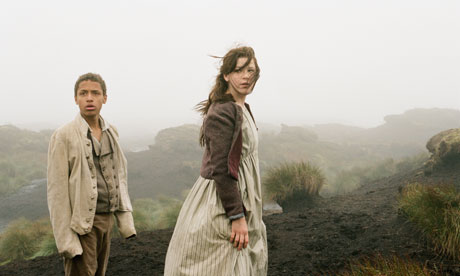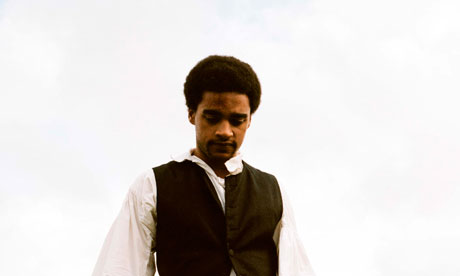Heathcliff: two syllables conjuring desolate space and dizzying altitude. The two ideas are well represented in this brilliant, visceral, though flawed version of the Emily Brontë novel, a daring raid behind the lines of heritage English Lit. Director Andrea Arnold and cinematographer Robbie Ryan strip the story ruthlessly down to its bare essentials: pain, anger and love.
From the start, the film sweeps away the period choreography of the conventional literary adaptation, sweeps it away so thoroughly that for the first few minutes I thought that this Wuthering Heights must be set a hundred years after a nuclear strike. This version brings the story back to a kind of social-realist year zero. It dispenses with the "flashback" overture, plunging more or less straight into the action, but – like the 1939 William Wyler version with Laurence Olivier – it restricts itself to the "first generation" half of the book.
The real, unpretty toughness of the Yorkshire moor has perhaps never been represented more matter-of-factly, nor the hardscrabble existence of those who might have really lived in that farmhouse in the 19th century. This world is elemental, almost primeval, and the gap between human and beast is narrowed. Heathcliff is reimagined, not as the vaguely exotic dark-skinned Gypsy, but as simply black, and confronted with overt and brutal racism from those of his new family who resent the outsider, and are determined to treat him like any farm animal.
Played as a youth by Solomon Glave, Heathcliff is a homeless foundling, discovered on the streets of Liverpool by the taciturn Mr Earnshaw (Paul Hilton). In the distinctly accusatory spirit of Christian charity, Mr Earnshaw brings Heathcliff back to live at the grimly remote Wuthering Heights to earn his keep with labour, but also to live as an equal with the two children: the older boy Hindley (Lee Shaw) and the younger girl Cathy (Shannon Beer). Almost immediately, Heathcliff runs wild with Cathy on the moor all the livelong day, a passionate childhood romance, heedlessly erotic, innocent in a knowing way, protected and made more glorious by their supposed sibling relationship.
They go riding together on one horse: Heathcliff leans in and inhales the perfume from Cathy's hair while stroking and kneading his horse's flank. When Heathcliff is beaten for insolence and idleness, Cathy literally licks his wounds: an ecstatic moment of transgression and defiance. But as they grow to adulthood, Cathy accepts a marriage proposal from the rich neighbour Edgar Linton (James Northcote); deeply angered and hurt, Heathcliff runs away and returns years later as a man, obsessed with love and vengeance, intent on the reopening of wounds. Now he is played by James Howson, and Cathy by Kaya Scodelario.
In the most extraordinary way, Arnold achieves a kind of pre-literary reality effect. Her film is not presented as another layer of interpretation, superimposed on a classic's frills and those of all the other remembered versions, but an attempt to create something that might have existed before the book, something on which the book might have been based, a raw semi-articulate series of events, later polished and refined as a literary gemstone. That is an illusion, of course, but a convincing and thrilling one.
Perhaps above everything else, Arnold returns us to the most potent fact about the Cathy and Heathcliff love affair: it is a love affair between equals, not between a woman with coquettish "erotic capital" and a man with property and status. Cathy and Heathcliff are both outsiders: the woman dependent for her future on a marriage proposal, the man on a benefactor's charity. And it is a love story between children; it is as children that their love is happiest and most uncompromised and, probably, most clearly doomed.
That said, the decision to use two separate actors to play Cathy and Heathcliff, in their younger and older guises, was for me a little uncomfortable: it is understandable, of course, but the younger leads are, in fact, not so very young, and their later selves are not so very much older, and the apparent transformation is an oddly artificial effect.
It is a minor consideration, given that there is so much in Arnold's film that is exhilarating. There is a scene in which characters savour the wild windiness of a hilltop that reminded me of people doing very much the same thing at the top of a grim tower block, with an open window, in her 2006 movie Red Road, and yet the comparison isn't ironic. The landscape is desentimentalised so deliberately that it could be urban, the crags and fields could as well be concrete walkways, but they retain a stark beauty, and Arnold and Ryan are challenging what we think of as beautiful in the first place. The film gave me something I never expect to get from any classic literary adaptation: the shock of the new.











